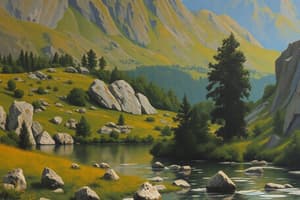Podcast
Questions and Answers
What can be inferred about the document based on the description provided?
What can be inferred about the document based on the description provided?
- It provides a comprehensive list of scientists and their contributions. (correct)
- It focuses on the specific instruments invented by scientists.
- It exclusively discusses instruments used in scientific experiments.
- It details the life stories of various scientists.
Which of the following would NOT be found in the document?
Which of the following would NOT be found in the document?
- Biographical details of scientists.
- A list of inventions by various scientists.
- Contributions across multiple fields of scientific inquiry.
- In-depth analysis on a single scientific instrument. (correct)
If a scientist is referenced in the document, what information is most likely included?
If a scientist is referenced in the document, what information is most likely included?
- Summaries of their personal life events.
- The particular fields they contributed to. (correct)
- The specific tools they used in their research.
- Their personal philosophical beliefs.
How would you best describe the breadth of topics covered in the document?
How would you best describe the breadth of topics covered in the document?
What kind of content would be least relevant to include in this document?
What kind of content would be least relevant to include in this document?
Flashcards
Scientists
Scientists
Individuals who use scientific methods to study and explore the natural world.
Inventions
Inventions
New devices or processes created to solve problems or perform specific tasks.
Fields of scientific inquiry
Fields of scientific inquiry
Different branches of science focused on specific areas of study, such as biology or physics.
Contributions
Contributions
Signup and view all the flashcards
Comprehensive list
Comprehensive list
Signup and view all the flashcards
Study Notes
Earth
- Age: 93, 115, 116 billion years
- Circumference: 21, 34
- Density/weight: 94, 96-97
- Flat Earth theory: 16, 17
- Floating disk theory: 11, 12
- Geocentric universe: 33, 46-48, 52
- Geological structure: 115
- Rotation: 282
- Solid core: 217
- Tectonic plates: 206-207
- Earthquakes: 22, 217
- Edison, Thomas: 159
- Edwards, Robert: 261
- Einstein, Albert: 151, 168, 171, 196, 197, 198-203, 216, 221, 240, 279, 299, 300
Energy
- Of chemical compounds: 232
- Conservation of: 139
- And mass: 197, 201
- Of molecules: 234
- Nuclear: 199, 201
- Quanta: 168, 170-171, 189
- Quantum mechanics: 300
- Transfer of: 139
Engineering
- Bell: 159
- Brill: 310
- Bush: 235
- da Vinci: 43, 45
- Tereshkova: 296
- Watt: 97
- Enigma machines: 256-257
- ENQUIRE program: 305
- Enzymology: 236
Other Topics
- Eratosthenes of Cyrene: 19, 21
- Ethology: 231, 294
- Euclid: 30, 130, 33, 36, 38
- Eureka: 19, 20
- Europium: 239
- Event horizons: 300
- Evolution: Darwin 132-137, de Vries 142, Dobzhansky 260
- Rejected by Cuvier and Agassiz: 117
- Wallace: 135
- Weismann: 161
- Experimental physics: 252
- Experimental science: 67, 68
- Extinctions: 115-116, 252
- Eyes: 166, 297
Studying That Suits You
Use AI to generate personalized quizzes and flashcards to suit your learning preferences.


